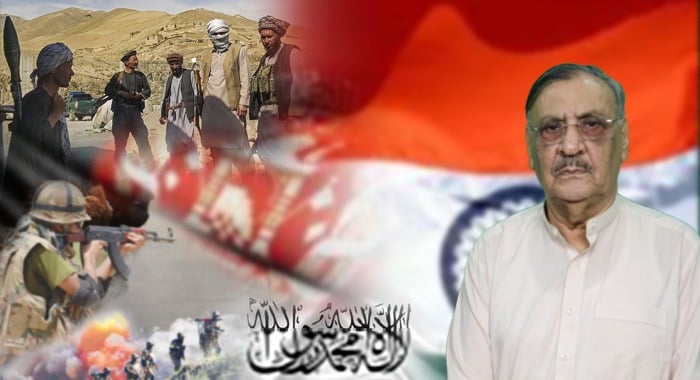Brig (R) Mehmood Shah
The recent remarks by Pakistan’s Army Chief, Field Marshal General Syed Asim Munir, characterizing Afghanistan as a brother Islamic country while warning against the chaos festering across both Afghanistan and India, should not be mistaken for routine diplomatic nuance. His words serve as a calculated and timely warning: Pakistan today faces a coordinated hybrid war waged not just by terrorist proxies but also through psychological, cyber, and economic warfare, with India’s intelligence agency, RAW, at its helm.
Despite religious affinity and historical ties, Afghan territory has morphed into a permissive space for violent actors working against Pakistan. Armed factions such as the Tehrik-e-Taliban Pakistan (TTP) operate from Afghan sanctuaries, launching deadly attacks with impunity. This defiance of cross-border peace persists despite binding fatwas from senior Taliban clerics including Emir Sheikh Haibatullah Akhundzada — categorically prohibiting jihad beyond Afghanistan’s borders. The enforcement vacuum, worsened by a fragmented Taliban leadership and the marginalization of once-powerful figures like Sirajuddin Haqqani, has led to a situation where militants dictate terms far more than Kabul does.
Pakistan’s security dilemma is compounded by the unchecked presence of undocumented Afghan nationals across urban centers such as Peshawar, Quetta, and Islamabad. Vulnerable and impoverished, some become pawns in espionage and sabotage networks. Iran’s recent counterintelligence operation, which exposed 141 foreign agents including 121 Indian operatives and 20 Mossad-linked assets highlighted Afghanistan as a secondary launchpad for espionage, second only to India itself. This revelation should trigger urgent introspection and recalibrated policy in Islamabad.
India has long weaponized its economic leverage to cultivate alliances that marginalize Pakistan, even within the Muslim world. The lure of India’s billion-strong market often silences shared religious and strategic values. Iran’s dual posture friendship with India while proclaiming Islamic solidarity is particularly alarming. Tehran’s own operations recently uncovered an extensive espionage web known as Gideon Asia, implicating Indian and Israeli agencies. These foreign agents had infiltrated not just Iranian territory but also established nodes within Baloch insurgent factions like the Balochistan Liberation Army (BLA), which has waged a brutal separatist war against Pakistan.
Pakistan’s intelligence agencies must be credited for uncovering the massive financial pipelines sustaining terrorism. Over USD 3.2 million roughly one billion Pakistani rupees has been funneled into Pakistan via clandestine Hawala and Hundi systems. These funds fuel militancy and bankroll a relentless digital disinformation campaign targeting Pakistan’s state and military institutions. Often routed through Dubai and transited by mules or couriers, this terror finance network is both sophisticated and deeply entrenched.
In one instance, a TTP operation was promised PKR 10 million; when only PKR 9 million was delivered, the shortfall cost the responsible courier his life murdered by his own group. This chilling anecdote underscores the ruthless efficiency and high stakes within terror financing networks. During my own tenure in Waziristan, I personally intercepted an Uzbek female courier smuggling passports and a donor list taped to her body irrefutable proof of the foreign orchestration behind these operations.
There are recurring calls to negotiate with armed non-state actors. Let me be unequivocal: the Pakistani state governed by its Constitution and representing 240 million citizens cannot and must not enter into negotiations with those who reject its legitimacy and laws. During General Qamar Javed Bajwa’s era, I was consulted on the feasibility of talks with the TTP. I advised firmly against it then, and I repeat it now: peace is forged between sovereigns, not between a legitimate state and violent militias. The Constitution offers no space for parallel, extra-constitutional diplomacy.
Similarly, the so-called Peace Jirgas sent to Afghanistan under General Faiz Hameed, involving political figures like Barrister Saif, lacked both legal authority and strategic utility. By definition, a Jirga must be able to enforce its verdicts. Without enforceability, such efforts amount to little more than symbolism.
The only ethical, legal, and strategically viable response is state-sanctioned force. Our Constitution permits the use of force to defend territorial integrity and national security. Whether threats emerge six kilometers from our borders or beyond, Pakistan retains the sovereign right under both domestic and international law to pre-empt and neutralize them. Our armed forces, uniquely equipped and mandated, remain the vanguard of this defence.
Militancy in Pakistan’s tribal and border regions is not always rooted in ideology. Often, it is born from personal vendettas, survival instincts, or revenge cycles that span generations. These blood feuds have become the recruiting ground for militant outfits. If reintegration or surrender is ever to be considered, it must happen within the framework of the state’s legal system however imperfect to ensure accountability, protection, and due process.
Pakistan today stands at the epicenter of a hybrid war designed to erode its sovereignty, fracture its society, and exhaust its military through a thousand cuts. India, in concert with regional collaborators, seeks to bleed Pakistan not only through violence but also through narrative warfare, cyber subversion, and economic coercion.
This is not a time for ambiguity or appeasement. It is a moment that demands clarity, unity, and resolve. Pakistan must develop a coherent, comprehensive policy that combines military power, intelligence coordination, regional diplomacy, and ideological clarity. Only then can we navigate this storm and secure the future of our nation not just for today, but for generations to come.





